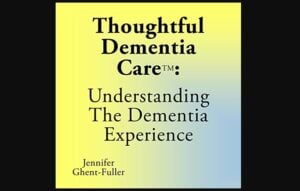The following tips can help make communications with those experiencing memory loss meaningful:
- Center yourself. As soon as you start to get upset or frustrated, stop and concentrate on taking deep, slow breaths while focusing on something that makes you feel calm and collected.
- Use empathy. Using empathy to connect includes focusing on the experience of your loved one with memory loss. It is important to connect with their feelings, rather than the context of their words.
- Enter their world. Unless your loved one is in the very early stage of memory loss and wants to be reminded of a date, time or other reality based topic, join their journey rather than force reality on them.
- Ask open questions. Use open-ended questions to redirect the conversation and to show that you’re interested in exploring what is important to them. For example, if your loved one is insisting on visiting their deceased mother, rather than reminding them that she passed away, ask her to tell you about her mother and listen with empathy as she expresses her feelings.
- Try asking the extreme. Asking the extreme means that you ask the person to tell you the best or worst thing about what they are expressing.
For more insights and and tips, browse these recommended books on communications for dementia caregivers:
- Learning to Speak Alzheimer’s
- Connecting the Dots
- Talking to Alzheimer’s
- You Say Goodbye and We Say Hello
- The 36-Hour Day (The Most Popular Book on Dementia Care)
- Creating Moments of Joy












I recommend using a smart pill box. Let the medication reminder do the work for you. Try https://medqpillbox.com/